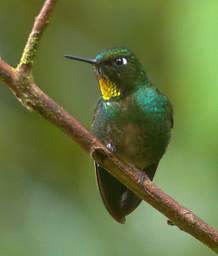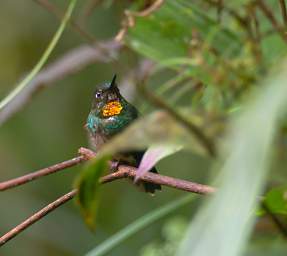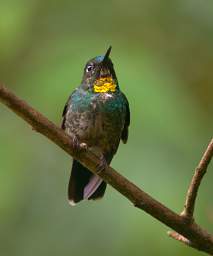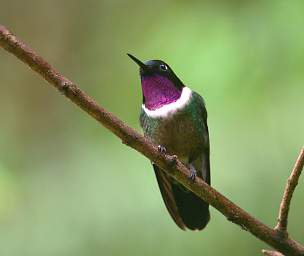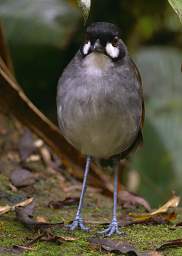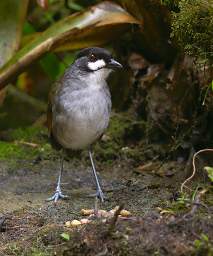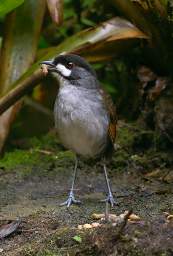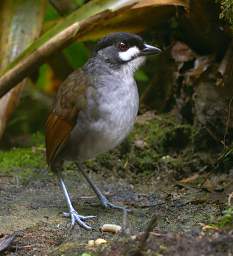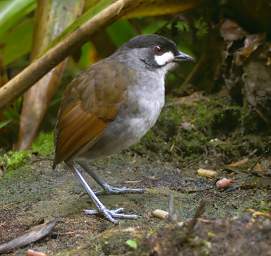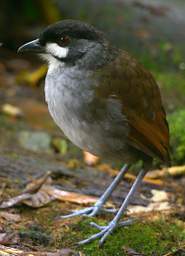Birding in Southern Ecuador
Casa Simpson
late February and early March, 2015
Click on any image for a larger view;
Contact garya at this domain if you would like the high quality image for printing
We left Urraca early, with Patricio driving us in his truck again.
He was in a great mood.
On the map it didn't seem like we were going that far,
but in this mountainous terrain with winding gravel roads and landslides time is more relevant than distance.
We would wind up and up and up,
and then down and down and down,
and then up and up and up,
and down and down and down.
It was fun, and I enjoyed the unfolding view of southern Ecuador.
Depending on where we were, it was either sunny and pleasant
or overcast and a bit raw.
We saw far too much steep hillside cultivation
and the attendant erosion.
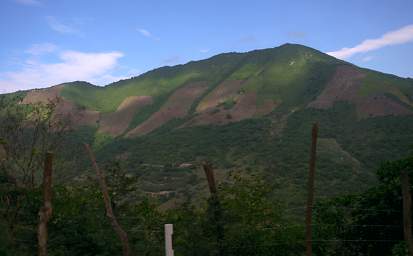 |
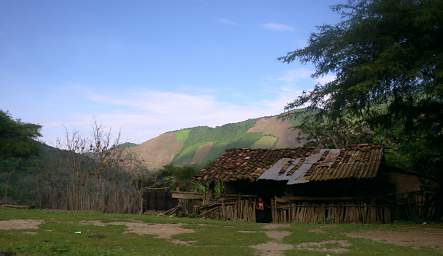 |
| Hillside Cultivation |
House |
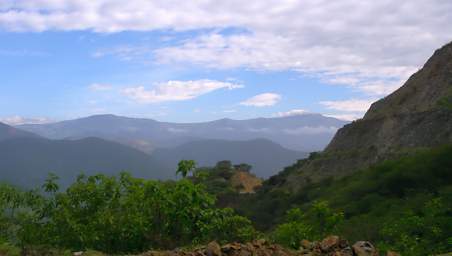 |
| Terrain |
Eventually we came to the town of Loja,
the regional center.
We were surprised and delighted to note wind generators at the pass where the road peaked
and headed down into town.
What we didn't find out was whether or not their location was in a frequented flyway,
which it may well have been;
which would not have been good.
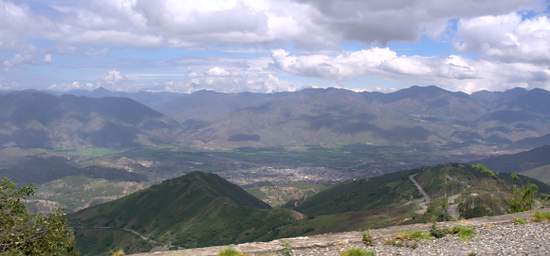 |
| Loja |
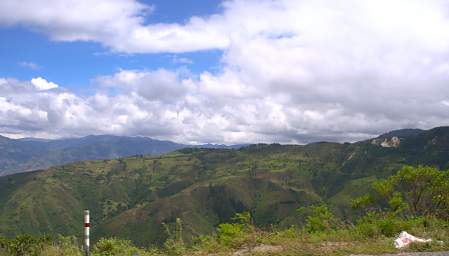 |
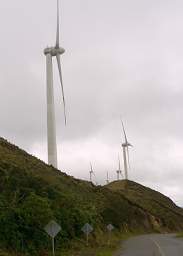 |
| Hillside Farms |
Windgenerators |
We ignored Loja, which apparently is now sufficiently developed to have become a "retirement destination" for gringos,
and continued on to Vilcabamba,
where Patricio stopped at a friend's restaurant for lunch.
Patricio informed us the weather in Loja isn't all that great,
so the folks over there head to Vilcabamba for recreation in the hot springs and more sunshiny weather.
 |
| Vilcabamba Lunch: Dona, Ram, Patricio, and Dawn |
As we approached Casa Simpson,
it became obvious this was the land of "derrumbes" -- landslides.
We worked our way through them admidst a constant stream of dump trucks hauling debris
off somewhere.
Then we topped a rise and were greeted with signs of one of our principal quarries,
the
Jocoto Antpitta.
We knew we were close.
Casa Simpson is located in a biological reserve
at 2500 m on the east slope of the Andes.
From our experience it seems to be up in the clouds most of the time;
it drizzled a lot while we were there,
and the lodge had a fire going most of the time.
The wood always came in wet, and took a while to dry out enough to burn well.
When I was inside, I felt like I wanted to spend all my time in front of the fire.
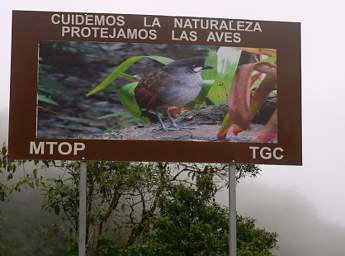 |
| Antpitta Sign |
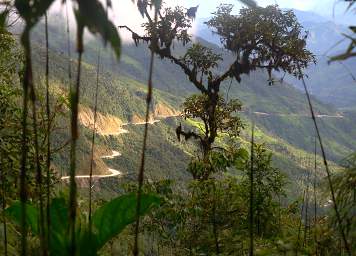 |
| Road to Casa Simpson |
Our rooms were comfortable and the showers were hot... a really good thing in this damp climate.
They didn't want us hanging things on the radiator or in front of the fire
so it was a bit of an art drying things out.
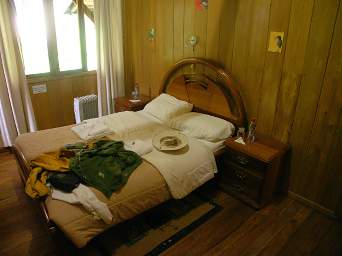 |
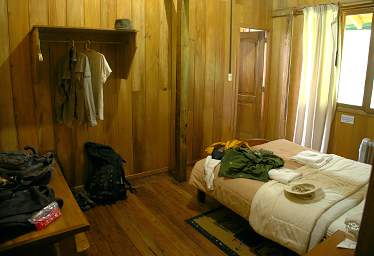 |
| Casa Simpson Room |
There was a constant parade of hummingbirds to the feeders around the lodge,
as well as other birds.
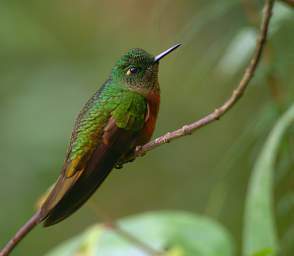 |
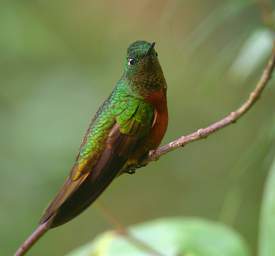 |
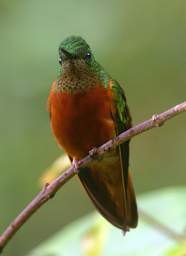 |
| Chestnut Breasted Coronet |
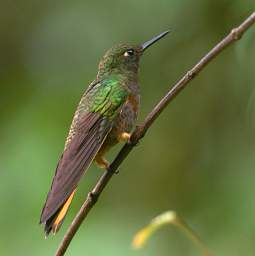 |
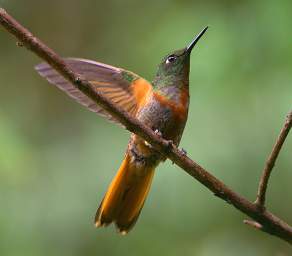 |
| Chestnut Breasted Coronet (F) |
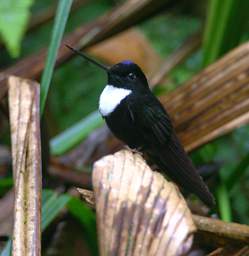 |
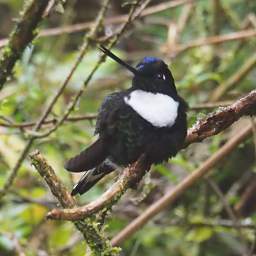 |
| |
Photo by Dona |
| Collared Inca |
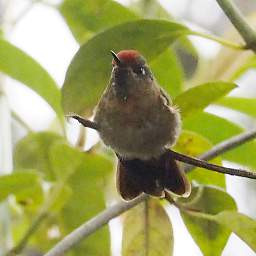 |
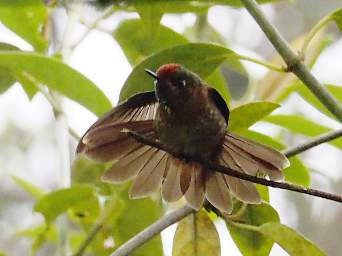 |
| Photos by Dona |
| Rufous Capped Thornbill |
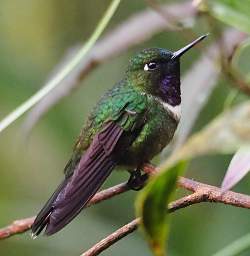 |
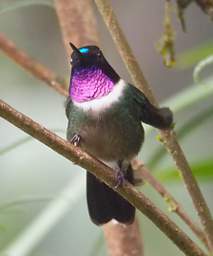 |
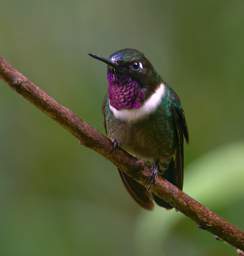 |
| Photo by Dona |
Photo by Dona |
| Amethyst Throated Sunangel |
One of our favorite hummingbirds is the long-tailed sylth,
and one made numerous appearances.
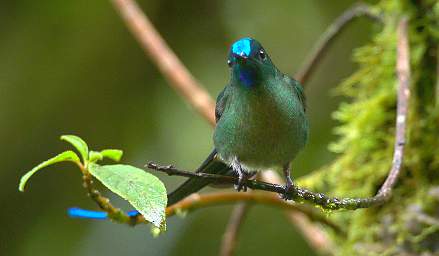 |
| Long Tailed Sylth |
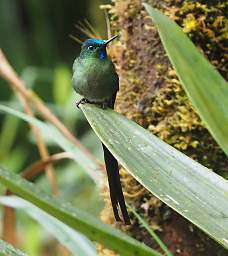 |
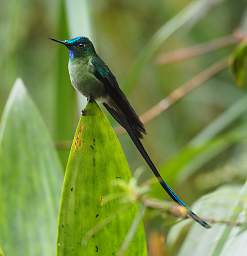 |
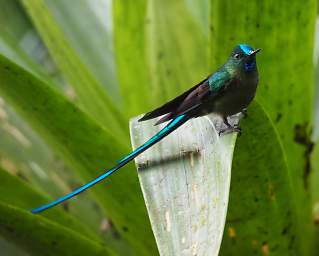 |
| Photos by Dona |
| Long Tailed Sylth |
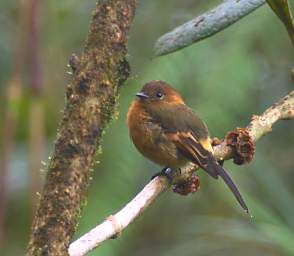 |
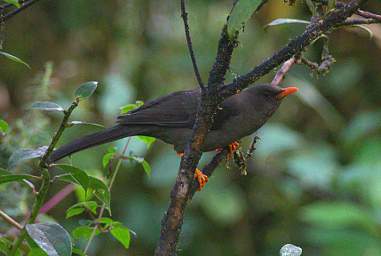 |
| Cinnamon Flycatcher |
Great Thrush |
There was a Swiss student staying at Casa Simpson helping with research on
Golden Plumed Parakeets,
and she was also helping in the kitchen.
Maria's desserts were outstanding; we could never get enough of them.
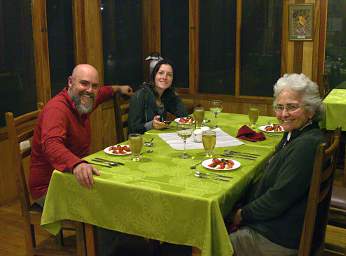 |
| Casa Simpson Dessert |
Casa Simpson is "the place to go" to see the Jocotoco Antpitta.
It was discovered only recently, while researchers were looking for another antpitta.
The lodge is full of antpitta art.
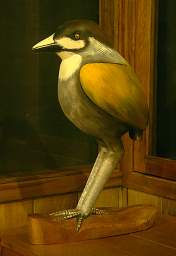 |
| Jocotoco Antpitta Carving |
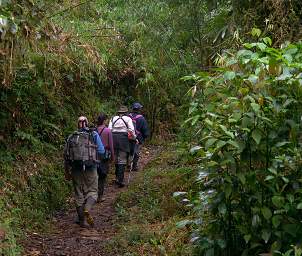 |
| Ram, Dawn, Dona, and Diego on the trail to the Jocotoco Antpitta |
Casa Simpson has numerous trails radiating out from the lodge,
and we tried to walk as many as we could.
However, the weather was not particularly cooperative,
and we sometimes got rained out.
But when they were good, at the right time of day,
there were great birds to be seen.
Our guide, Diego, was terrific;
a happy guy full of information and eager to please.
The first morning we headed out to see the Jocotoco Antpitta;
we didn't want to miss it.
From our other experiences looking for antpittas,
they can be difficult to call in at times.
But Diego had this one more or less trained.
It showed up pretty much when called,
and even allowed a new member of the family to present him/herself.
Ram brought his big lens,
as on all other antpitta feeding station excursions we were a fair ways from where the birds showed up.
It was a bit too long in this case...
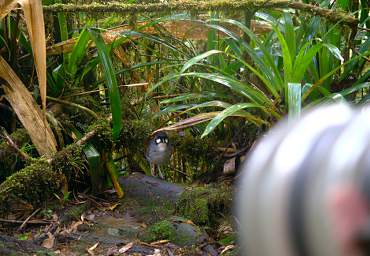 |
| Looking down Ram's Lens to a Jocotoco Ant Pitta |
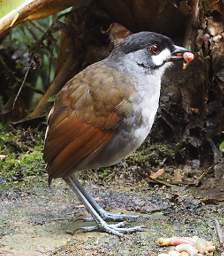 |
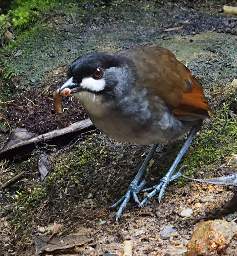 |
| Photos by Dona |
| Jocotoco Antpitta |
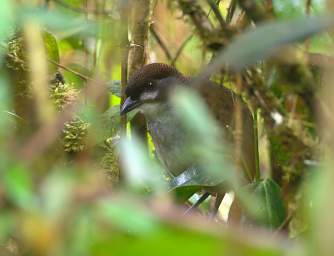 |
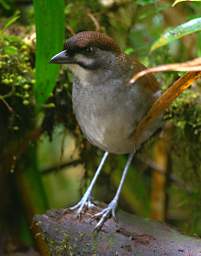 |
| Jocotoco Ant Pitta Juvenile |
As usual, I went looking for tanagers;
they were not very cooperative, and the drizzle didn't help.
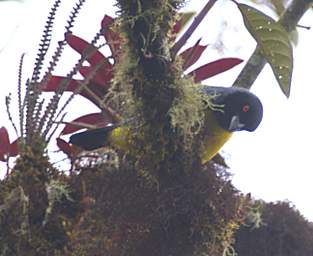 |
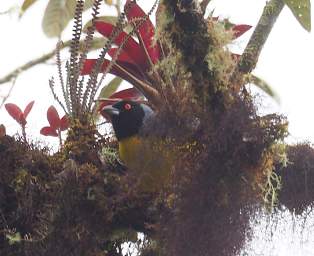 |
| |
Photo by Dona |
| Hooded Mountain Tanager |
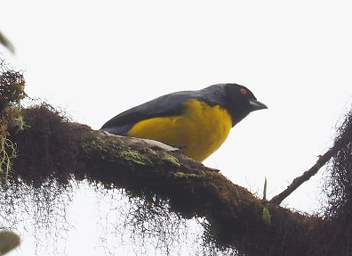 |
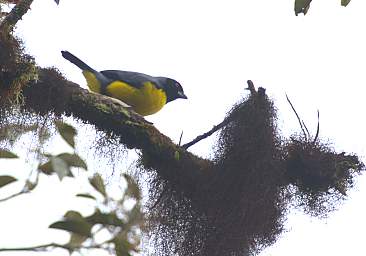 |
| Photo by Dona |
Our old friend the Masked Flowerpiercer
showed up near the hummingbird feeders.
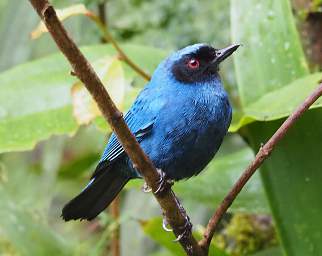 |
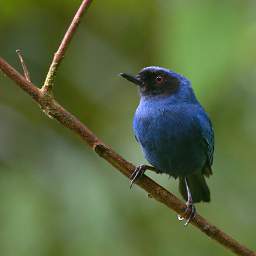 |
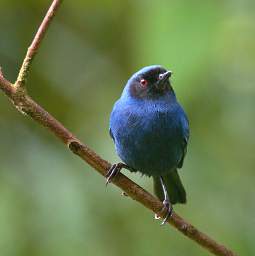 |
| Photo by Dona |
| Masked Flowerpiercer |
The studies being done on the Golden Plumed Parakeet were nesting studies,
and we found a pair nesting in a cavity of a tree near one of the traiils.
We didn't want to disturb them,
so we snuck pictures from behind a shrub further down the trail.
They are pretty cool.
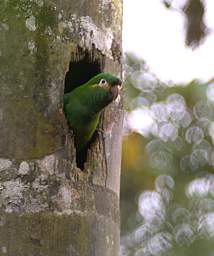 |
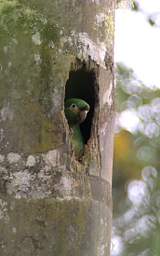 |
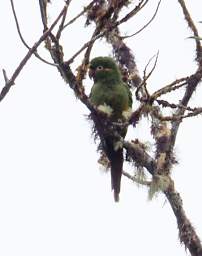 |
| |
Photo by Dona |
| Golden Plumed Parakeet |
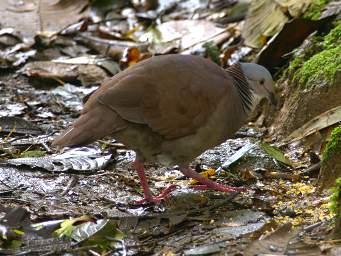 |
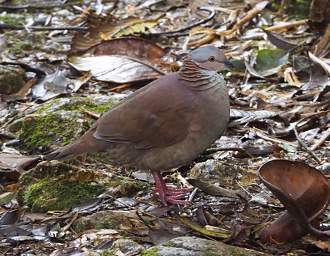 |
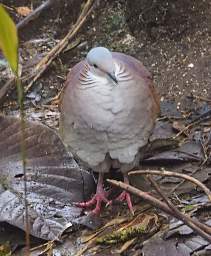 |
| |
Photo by Dona |
Photo by Dona |
| White Throated Quail Dove |
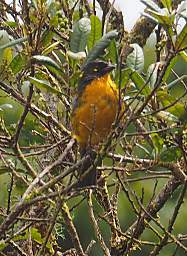 |
Xxx Yellow
Photo by Dona |
As usual, we found some cool butterflies.
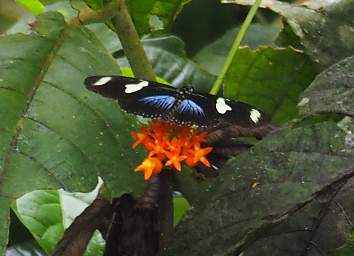 |
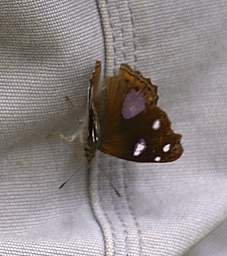 |
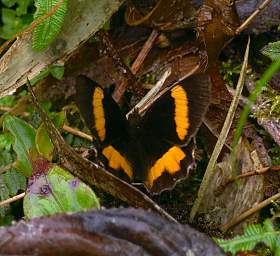 |
| Photo by Dona |
| Doris Longwing (Heliconius Doris) |
Butteryfly Xxx |
Butterfly Xxx Orange |
I took a long walk up the road,
heading for a trail I thought had potential for a good views and lots of birds.
But it was drizzly and the trail was heavily overgrown,
so I couldn't see much and turned around after a while.
On my way back I was looking into the ravines on the downhill side of the road,
and in one of them I saw a tapir.
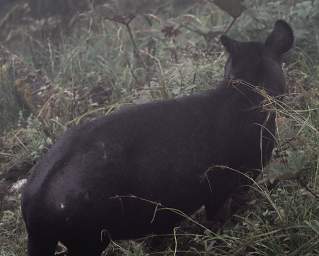 |
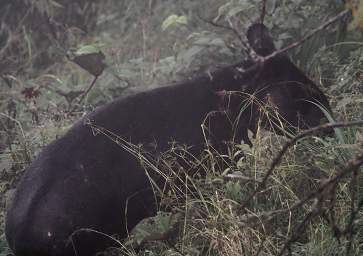 |
| Mountain Tapir |
The flowers were, as usual, many and varied and a mystery for identification.
Some of them were pretty crazy, like the ones growing out of the center of a leaf,
and the fruits that look like a medieval weapon with the thorns on them.
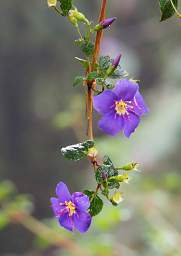 |
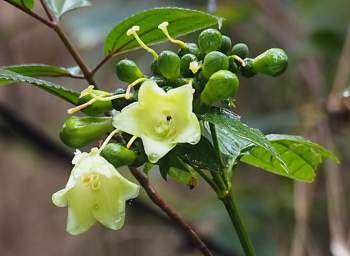 |
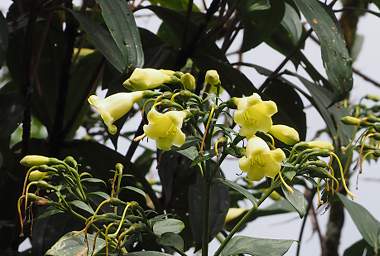 |
Flower Xxx Blue Yellow
Photo by Dona |
Flower Xxx Yellow
Photo by Dona |
Flower Xxx Yellow
Photo by Dona |
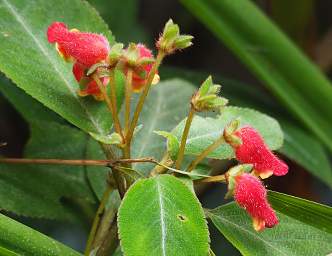 |
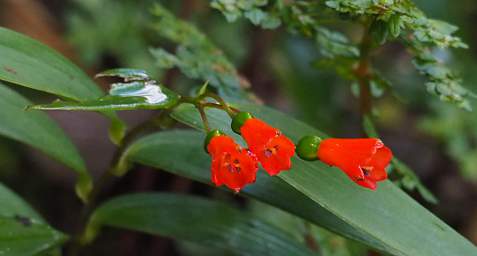 |
Flower Xxx Red
Photo by Dona |
Flower Xxx Red
Photo by Dona |
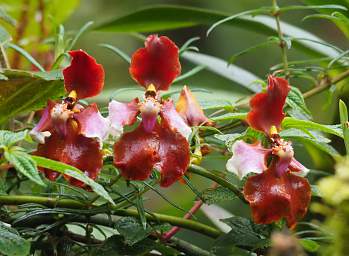 |
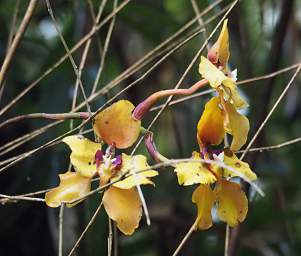 |
Orchid Xxx Red
Photo by Dona |
Orchid Xxx Yellow
Photo by Dona |
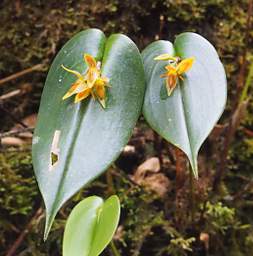 |
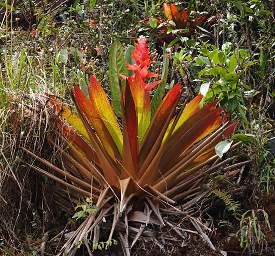 |
Flower Xxx Yellow
Photo by Dona |
Flower Xxx Red
Photo by Dona |
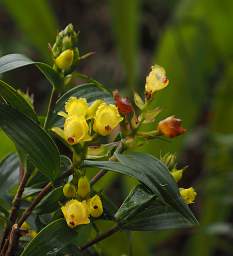 |
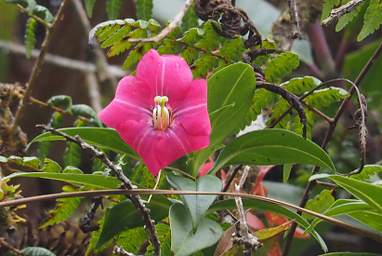 |
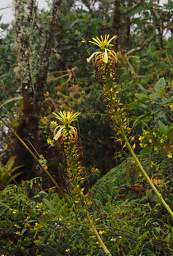 |
Flower Xxx Yellow
Photo by Dona |
Flower Xxx Pink
Photo by Dona |
Flower Xxx Yellow
Photo by Dona |
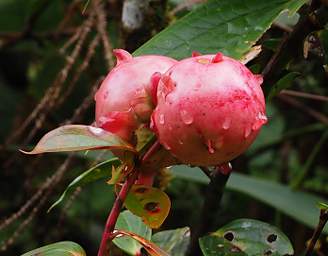 |
Fruit Xxx Red
Photo by Dona |
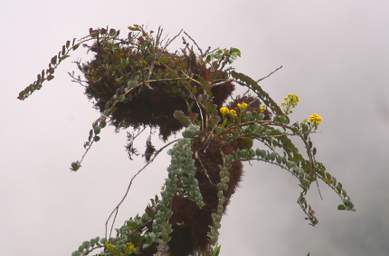 |
| Flowers In Tree |
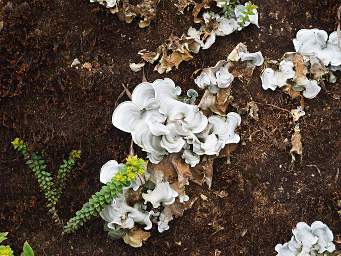 |
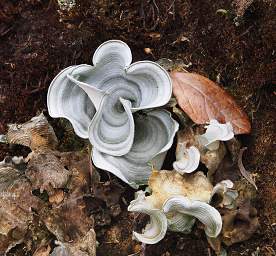 |
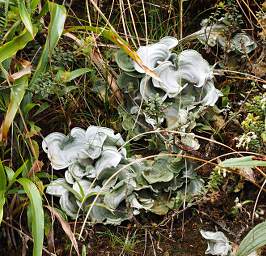 |
Fungus Xxx Green
Photos by Dona |
Occasionally we would see what looked like a lone tree covered with white blossoms,
but they turned out to be the leaves.
Some of the most important trees in the area are
Podocarpus,
a conifer which with my northern temperate zone perspective
doesn't look like a conifer at all.
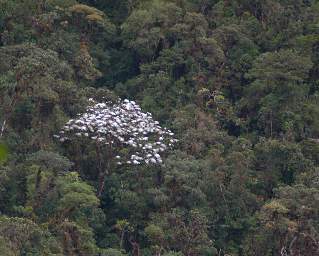 |
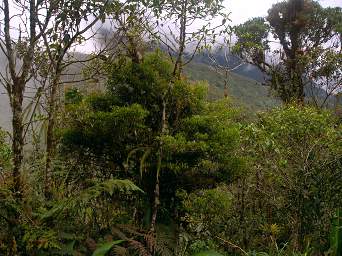 |
| White Leaved Tree |
Podocarpus Tree |
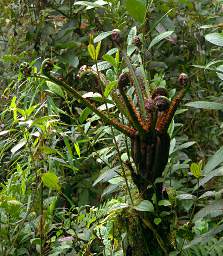 |
| Huge Fern |
They had a great poster hanging on the wall showing local hummingbirds and some of the flowers
on which they feed.
I was hoping it would help me identify and label some of the pictures but
I'm not doing very well in that department...
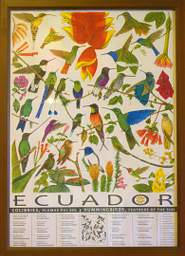 |
| Bird and Flower Poster |
Then we were off to our final bird haven,
Copalinga.
But before we could get there,
we had to navigate more derrumbes
and the attendant road construction.
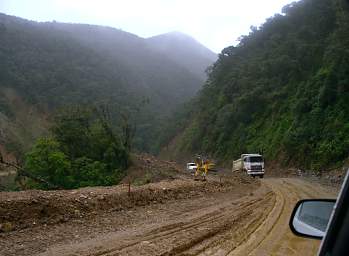 |
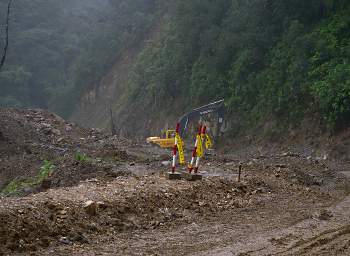 |
| Road Work |
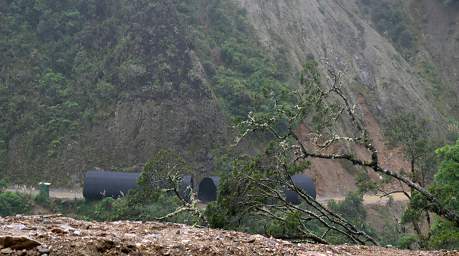 |
| Big Culverts |






















